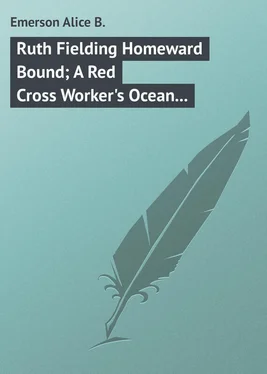Alice Emerson - Ruth Fielding Homeward Bound; A Red Cross Worker's Ocean Perils
Здесь есть возможность читать онлайн «Alice Emerson - Ruth Fielding Homeward Bound; A Red Cross Worker's Ocean Perils» — ознакомительный отрывок электронной книги совершенно бесплатно, а после прочтения отрывка купить полную версию. В некоторых случаях можно слушать аудио, скачать через торрент в формате fb2 и присутствует краткое содержание. Издательство: Иностранный паблик, Жанр: foreign_prose, foreign_language, на английском языке. Описание произведения, (предисловие) а так же отзывы посетителей доступны на портале библиотеки ЛибКат.
- Название:Ruth Fielding Homeward Bound; A Red Cross Worker's Ocean Perils
- Автор:
- Издательство:Иностранный паблик
- Жанр:
- Год:неизвестен
- ISBN:нет данных
- Рейтинг книги:3 / 5. Голосов: 1
-
Избранное:Добавить в избранное
- Отзывы:
-
Ваша оценка:
- 60
- 1
- 2
- 3
- 4
- 5
Ruth Fielding Homeward Bound; A Red Cross Worker's Ocean Perils: краткое содержание, описание и аннотация
Предлагаем к чтению аннотацию, описание, краткое содержание или предисловие (зависит от того, что написал сам автор книги «Ruth Fielding Homeward Bound; A Red Cross Worker's Ocean Perils»). Если вы не нашли необходимую информацию о книге — напишите в комментариях, мы постараемся отыскать её.
Ruth Fielding Homeward Bound; A Red Cross Worker's Ocean Perils — читать онлайн ознакомительный отрывок
Ниже представлен текст книги, разбитый по страницам. Система сохранения места последней прочитанной страницы, позволяет с удобством читать онлайн бесплатно книгу «Ruth Fielding Homeward Bound; A Red Cross Worker's Ocean Perils», без необходимости каждый раз заново искать на чём Вы остановились. Поставьте закладку, и сможете в любой момент перейти на страницу, на которой закончили чтение.
Интервал:
Закладка:
Of all their clique, Ruth had been the only girl who had worked right up on the battleline and had really seen much of the war. The visitors wanted to know all about it. And that Ruth had been injured by a Hun bomb made her all the more interesting to these young American women who, if they were not all of the calibre of the girl of the Red Mill, were certainly in earnest and interested in their own part of the work.
The surgeons had been wise, perhaps, in advising Ruth to take boat as soon as possible for the American side of the Atlantic. The Red Cross authorities gave her but a few days in Paris before she had to go on to Brest – that great port which the United States had built over for its war needs.
Helen and Jennie insisted on going with her to Brest. Indeed, Ruth found herself so weak that she was glad to have friends with her. She knew, however, that there would be those aboard the Admiral Pekhard , the British transport ship to which she was assigned, who would give her any needed attention during the voyage.
Up to the hour of sailing, Ruth received messages and presents – especially flowers – from friends she was leaving behind in France. Down to the ship came a boy from a famous florist in Paris – having traveled all the way by mail train carrying a huge bunch of roses.
“It’s from Tom,” cried Helen excitedly, “I bet a penny!”
“What a spendthrift you are, Helen,” drawled Jennie. But she watched Ruth narrowly as the latter opened the sealed letter accompanying the flowers.
“You lose,” said Ruth cheerfully, the moment she saw the card. “But somebody at the front has remembered me just the same, even if Tom did not.”
“Well!” exclaimed Tom’s sister, “what do you know about that ?”
“Who is the gallant, Ruthie?” demanded Jennie.
“Charlie Bragg. The dear boy! And a steamer letter, too!”
Helen Cameron was evidently amazed that Tom was not heard from at this time. Ruth had kept to herself the knowledge that Tom was going to the aviation camp and expected to make his first trip into the air in the company of his friend, the American ace. This was a secret she thought Helen would better not share with her.
After she had opened Charlie Bragg’s letter on the ship she was very glad indeed she had said nothing to Helen about this. For along with other news the young ambulance driver wrote the following:
“Hard luck for one of our best flying men. Ralph Stillinger. You’ve heard of him? The French call him an ace, for he has brought down more than five Hun machines.
“I hear that he took up a passenger the other day. An army captain, I understand, but I did not catch the name. There was a sudden raid from the German side, and Stillinger’s machine was seen to fly off toward the sea in an endeavor to get around the flank of the Hun squadron.
“Forced so far away from the French and American planes, it was thought Stillinger must have got into serious trouble. At least, it is reported here that an American airplane was seen fighting one of those sea-going-Zeppelins – the kind the Hun uses to bomb London and the English coast, you know.
“Hard luck for Stillinger and his passenger, sure enough. The American airplane was seen to fall, and, although a searching party discovered the wrecked machine, neither its pilot nor the passenger was found.”
Charlie Bragg had no idea when he wrote this that he was causing Ruth Fielding, homeward bound, heartache and anxiety. She dared tell Helen nothing about this, although she read the letter before the Admiral Pekhard drew away from the pier and Helen and Jennie went ashore.
Of course, Stillinger’s passenger might not have been Tom Cameron. Yet Tom had been going to the aviation field expecting to fly with the American ace. And the fact that Tom had allowed her, Ruth, to sail without a word of remembrance almost convinced the girl of the Red Mill that something untoward had happened to him.
It was a secret which she felt she could share with nobody. She set sail upon the venturesome voyage to America with this added weight of sorrow on her heart.
CHAPTER VI – A NEW EXPERIENCE
Tom landed from a slowly crawling military train at a place some miles behind the actual battleline and far west of the sector in which his division had been fighting for a month. This division was in a great rest camp; but Tom did not want rest. He craved excitement – something new.
In a few hours an automobile which he shared with a free-lance newspaper man brought him to a town which had been already bombarded half a dozen times since Von Kluck’s forced retreat after the first advance on Paris.
As Tom walked out to the aviation field, where Ralph Stillinger’s letter had advised his friend he was to be found, all along the streets the American captain saw posters announcing Cave Voûteé with the number of persons to be accommodated in these places of refuge, such number ranging from fifteen to sixty.
The bomb-proof cellars were protected by sandbags and were conveniently located so that people might easily find shelter whenever the German Fokkers or Tauben appeared. Naturally, as the town was so near the aviation field, it was bound to be a mark for the Hun bombing planes.
Sentinels were posted at every street corner. There were three of the anti-aircraft .75‘s set up in the town. Just outside the place were the camps of three flying escadrilles, side by side. One of these was the American squadron to which Ralph Stillinger, Tom’s friend, was attached.
Each camp of the airmen looked to Tom, when he drew near, like the “pitch” of a road show. With each camp were ten or twelve covered motor-trucks with their tentlike trailers, and three automobiles for the use of the officers and pilots.
Tom had not realized before what the personnel of each équipé was like. There were a dozen artillery observers; seven pilots; two mechanicians to take care of each airplane, besides others for general repair work; and chauffeurs, orderlies, servants, wireless operators, photographers and other attachés – one hundred and twenty-five men in all.
Tom Cameron’s appearance was hailed with delight by several men who had known him at college. Not all of his class had gone to the Plattsburg officer’s training camp. Several were here with Ralph Stillinger, the one ace in this squadron.
“You may see some real stuff if you can stay a day or two,” they told the young captain of infantry.
“I suppose if there is a fight I’ll see it from the ground,” returned Tom. “Thanks! I’ve seen plenty of air-fights from the trenches. I want something better than that. Ralph said he’d take me up.”
“Don’t grouch too soon, young fellow,” said Stillinger, laughing. “We’re thirty miles or so from the present front. But in this new, swift machine of mine (it’s one of the first from home, with a liberty motor) we can jump into any ruction Fritzie starts over the lines in something like fifteen minutes. I’ll joyride you, Tommy, if nothing happens, to-morrow.”
It was not altogether as easily arranged as that. Permission had to be obtained for Ralph to take his friend up. The commander of the squadron had no special orders for the next day. He agreed that Ralph might go up with his passenger early in the morning, unless something interfered.
The young men were rather late turning in, for “the crowd” got together to swap experiences; it seemed to Tom as though he had scarcely closed his eyes when an orderly shook him and told him that Lieutenant Stillinger was waiting for him out by Number Four hangar – wherever that might be.
Tom crept out, yawning. He dressed, and as he passed the kitchen a bare-armed cook thrust a huge mug of coffee and a sandwich into his hands.
Читать дальшеИнтервал:
Закладка:
Похожие книги на «Ruth Fielding Homeward Bound; A Red Cross Worker's Ocean Perils»
Представляем Вашему вниманию похожие книги на «Ruth Fielding Homeward Bound; A Red Cross Worker's Ocean Perils» списком для выбора. Мы отобрали схожую по названию и смыслу литературу в надежде предоставить читателям больше вариантов отыскать новые, интересные, ещё непрочитанные произведения.
Обсуждение, отзывы о книге «Ruth Fielding Homeward Bound; A Red Cross Worker's Ocean Perils» и просто собственные мнения читателей. Оставьте ваши комментарии, напишите, что Вы думаете о произведении, его смысле или главных героях. Укажите что конкретно понравилось, а что нет, и почему Вы так считаете.












